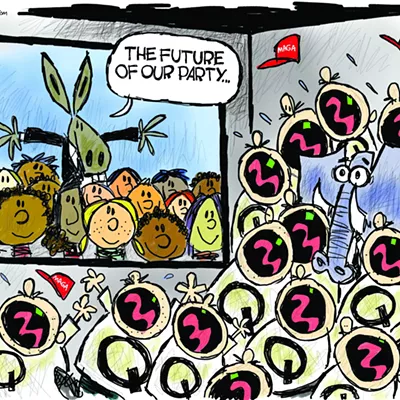On its surface, this 44-word measure appears simple enough. If approved by the voters, it would allow the Arizona Board of Regents and the state's three public universities to become part owners or accept stock in companies which want to license or transfer either technology or intellectual properties from the universities. Presently, the state Constitution requires cash payments for these transactions, but Proposition 102 would change that.
The result, according to proponents, would be that some start-up companies which now can't afford the cash payment could be accommodated. They might then hire employees and possibly return a sizable profit to the universities.
"I'm proud to be in opposition to the proposition, and I love being on the small side of an issue," Haney says. He believes all the heavyweight political and business backing of the measure should make people extremely suspicious.
The Phoenix resident has two primary concerns with 102. First, he thinks there is a lack of fiscal controls in place to ensure accountability for what the universities do with the stock they would receive. Haney wrote in the state's proposition publicity pamphlet: "Public officials giving away taxpayer-funded property, potentially for personal gain. ... We won't know which public official or their cronies are profiteering from taxpayer-funded research."
Haney's other objection is with the results those research efforts could achieve. Indicating he is pro-life and a strong supporter of the right-wing Republican position on cloning and stem-cell research, he fears passage of 102 could lead to skirting President Bush's stem-cell research rules.
"I'm very suspect of those in the academic world," Haney says. "Ninety percent of them are hard-core liberals."
One other argument against the proposition--which Haney didn't mention--is its potential to cost Arizona's universities. Even though its supporters insist there is "no risk to the taxpayer," there obviously is.
Under current constitutional requirements, companies which license university-developed technologies have to pay cash for that right. Those that are unable to come up with the money are left out of the process.
Proposition 102 would allow firms interested in using this technology to acquire it with stock instead of cash. But if the company goes broke, the universities would be left holding an empty money bag and be out the revenue they would have received as a cash payment.
Recognizing that possibility, even Tucsonan Rick Myers, co-chair of "Arizona Forward," which is pushing passage of the proposition, admits: "If the University of Arizona isn't smart about how they do (investments), they could leave money on the table."
But Myers believes the upside of passing 102 greatly offsets that potential risk.
"This is an important tool to aid in technology transfer," he says. "The University of Arizona can be a catalyst for start-up companies which create jobs. Thirty states now allow (this method), and it offers the opportunity to create more local businesses. It will be very positive in terms of stimulating economic activity."
In addition, Myers envisions direct monetary rewards for the University of Arizona.
"If a company hits it big," he says, "there could be significant money back to the university. That might help with (addressing) our brain-drain problem."
The financial impact on the university of adopting Proposition 102 is impossible to predict, but Patrick Jones hopes it is substantial. Jones, director of the UA's Technology Transfer Office, indicates there are now approximately 150 companies with licenses and options from the university in fields such as drugs, medical devices and optics. Twenty-five of these firms reached transfer agreements in the past year, four of which were start-up companies.
Combined, all these firms contribute about $1 million annually to the university budget. Jones thinks building toward $7 to $10 million each year, figures he considers typical of similar institutions, is a reasonable goal.
Jones says it will be his office which will decide when to take stock in a company instead of insisting on cash, but emphasizes there should be a diversification. He also disputes Haney's concerns about the proposition.
"University actions are not shielded from the public," Jones insists of the financial arrangements made with these private companies. "I don't see how the information could be hid."
Under a state law adopted last year, the universities are to treat companies involved with technology transfers just like any shareholder would. Members of the Board of Regents, however, are not prohibited from serving as directors of the companies, but must to do so on a voluntary basis.
As for stem cell research, Jones adds: "I don't see how the companies can circumvent federal and state laws, but the university doesn't control the companies."
To push passage of the proposition, Myers' group has raised more than $500,000 and spent it on a mailer to early voters and other campaign efforts. They might also use billboards and even Lute Olson to back the measure.
Haney, though, remains unimpressed with Proposition 102, while disappointed in the lack of attention to his point of view. He indicates talking to the Weekly was only his second media contact. Of other news sources, he concludes, "They don't want to shed the light of day on the proposition."
Despite that, Haney hopes voters turn it down. "There are obvious conflict-of-interest issues with Proposition 102. People should vote no."










